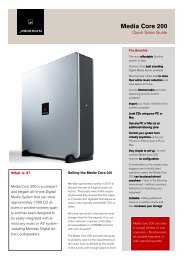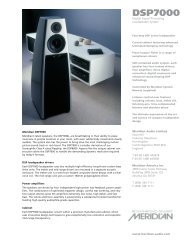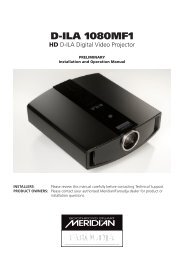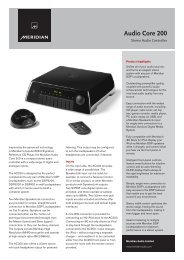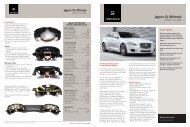2-channel A/D & digital format converter - Meridian Audio
2-channel A/D & digital format converter - Meridian Audio
2-channel A/D & digital format converter - Meridian Audio
You also want an ePaper? Increase the reach of your titles
YUMPU automatically turns print PDFs into web optimized ePapers that Google loves.
221 Media Player Digital Link<br />
2-<strong>channel</strong> A/D & <strong>digital</strong> <strong>format</strong> <strong>converter</strong><br />
High-resolution 2-<strong>channel</strong><br />
24-bit, 96kHz A/D and S/PDIF<br />
<strong>format</strong> <strong>converter</strong><br />
Studio-quality analogue to<br />
<strong>digital</strong> conversion<br />
Connect personal stereos<br />
and analogue components to<br />
<strong>Meridian</strong> DSP Loudspeakers<br />
or other S/PDIF inputs<br />
Line or headphone level in<br />
Converts S/PDIF Optical<br />
input to S/PDIF Coax out<br />
3.5mm stereo jack, optical<br />
S/PDIF and dual phono in<br />
Coax S/PDIF phono output<br />
USB or DC powered<br />
The MPMax 221 Media Player Digital<br />
Link, the latest in <strong>Meridian</strong>’s ‘MAX’ series<br />
of problem-solving boxes, overcomes a<br />
difficult challenge – getting analogue<br />
signals such as a personal stereo into<br />
<strong>digital</strong> products such as <strong>Meridian</strong> DSP<br />
Loudspeakers – with a simple one-piece<br />
solution.<br />
The vast majority of personal stereos, such as the Apple ® iPod ® offer a stereo analogue<br />
output at headphone level, designed for a 3.5mm stereo jack plug. Some additionally offer<br />
line level outputs or even S/PDIF optical outputs. Products like the Apple Airport Express ®<br />
provide a USB connector as well as analogue/optical <strong>digital</strong> connectors.<br />
The MPMax 221 Media Player Digital Link allows all these sources and many more to be<br />
connected directly to a pair of <strong>Meridian</strong> DSP Loudspeakers, or to any other system that<br />
requires a standard S/PDIF (Sony/Philips Digital Interface) phono input.<br />
The MPMax 221 includes the highest quality of analogue to <strong>digital</strong> conversion, in keeping<br />
with <strong>Meridian</strong>’s long tradition of superb <strong>digital</strong> and analogue audio engineering. Two <strong>channel</strong>s<br />
of conversion are provided, operating at 24-bit, 96kHz resolution – the standard <strong>format</strong><br />
used both in the studio and by <strong>Meridian</strong> DSP Loudspeakers. Special attention has been paid<br />
to minimising jitter and power supply interference with the conversion process. <strong>Audio</strong>philequality<br />
analogue components are coupled with the latest in studio-quality <strong>digital</strong> conversion<br />
technology, optimised for sources and levels of this type.<br />
The MPMax 221 allows the headphone or linelevel<br />
analogue output from a typical personal<br />
stereo such as the Apple iPod – or any line-level<br />
analogue signal, such as that from a legacy<br />
hi-fi component – to be fed directly into a pair<br />
of <strong>Meridian</strong> DSP Loudpeakers, thus making it<br />
possible to create a simple and compact replay<br />
system suitable, for example, for a bedroom<br />
or den, for which no additional components<br />
are required: volume control capability is<br />
provided by the <strong>Meridian</strong> loudspeaker remote.<br />
The MPMax 221 can also be used to connect<br />
analogue and <strong>digital</strong> optical components to any<br />
system which requires an S/PDIF coaxial <strong>digital</strong><br />
input at up to 24-bit, 96kHz.<br />
The MPMax221 also includes a <strong>digital</strong> optical<br />
input which can be used with devices that offer<br />
a <strong>digital</strong> optical output, allowing a completely<br />
<strong>digital</strong> path. If the audio files played back have<br />
been ripped with a lossless <strong>format</strong> such as<br />
FLAC, AAC/Apple Lossless or WMA Lossless, the<br />
system can offer full <strong>digital</strong> audio quality.<br />
The MPMax 221 contains a state-of-the-art<br />
2-<strong>channel</strong>, multibit Delta-Sigma Analogue<br />
to Digital <strong>converter</strong> and converts analogue<br />
input signals at true studio quality – 24-bit<br />
word-length, 96 kHz sampling – to match the<br />
high-resolution S/PDIF <strong>digital</strong> coaxial input of<br />
<strong>Meridian</strong> DSP Loudspeakers and components.
221 Media Player Digital Link<br />
2-<strong>channel</strong> A/D & <strong>digital</strong> <strong>format</strong> <strong>converter</strong><br />
Outline specifications<br />
MPMax 221<br />
Output<br />
Line level inputs<br />
2-<strong>channel</strong> analogue (headphone or line level) to coaxial<br />
S/PDIF <strong>converter</strong> and 2-<strong>channel</strong> optical S/PDIF to coaxial<br />
S/PDIF <strong>converter</strong> with auto analogue/<strong>digital</strong> input selection<br />
S/PDIF coaxial to IEC958 specifications. Phono connector<br />
Maximum input level 2.2V (rms)<br />
Input Impedance 20kΩ. Dual phono connectors (L&R)<br />
Headphone level in Maximum input level 1.0V (rms)<br />
Input Impedance 10kΩ. 3.5mm stereo jack socket<br />
Resolution<br />
Signal to noise ratio Better than 100dB<br />
THD + Noise<br />
Indicator<br />
Power supply<br />
Dimensions<br />
Weight<br />
Analogue to Digital conversion: 24-bit @ 96kHz<br />
Better than 84dB at full scale<br />
Green – Analogue to Digital Mode<br />
Amber – Optical S/PDIF input present and selected<br />
DC Input 6 to 15V, 150mA (PSU included)<br />
USB Supply, 5Vdc 150mA<br />
123mm (4.8in) W x 37mm (1.5in) H x 82mm (3.25in) D<br />
300g (12oz)<br />
The 4-layer printed circuit board used in the<br />
MPMax 221 has been carefully designed to<br />
provide maximum analogue/<strong>digital</strong> isolation,<br />
and employs the latest state-of-the-art surfacemount<br />
parts. On the analogue part of the<br />
board, audiophile-quality components ensure<br />
that both line-level and headphone level<br />
input signals are accurately matched for the<br />
conversion process, which is implemented to<br />
minimise jitter, power supply noise and other<br />
interference. Overall, the A/D conversion quality<br />
offered by the MPMax 221 is at such a high level<br />
that the only limitations on the quality of the<br />
signal will be those of the source component<br />
and the playback material.<br />
Multiple inputs are provided. A special 3.5mm<br />
jack socket accepts both analogue headphone<br />
signals and S/PDIF Optical (mini optical<br />
connector) inputs. If the optical input is used in<br />
conjunction with a network player or personal<br />
stereo or system that supports it, and lossless file<br />
<strong>format</strong>s such as FLAC, Apple Lossless or WMA<br />
Lossless are used, the audio signal supplied to<br />
the destination system can be identical to the<br />
original source material.<br />
Drive <strong>Meridian</strong><br />
DSP Loudspeakers<br />
directly<br />
Line level inputs are provided in the form of a<br />
pair of gold-plated phono connectors. The two<br />
analogue inputs are mixed at appropriate gains<br />
so as to provide similar levels.<br />
The output is in the form of a single gold-plated<br />
phono carrying 24/96 S/PDIF <strong>format</strong> signals to<br />
the destination system.<br />
The unit has a B-type USB connector which<br />
can be used to power the MPMax 221 as an<br />
alternative to the supplied power transformer.<br />
The unit will accept 9–15vDC at 150mA.<br />
A two-colour LED power indicator is provided.<br />
When S/PDIF Optical signals are detected,<br />
the <strong>digital</strong> input is selected automatically and<br />
the LED glows amber, indicating that <strong>format</strong><br />
conversion mode is operating, converting<br />
the optical input signal to S/PDIF Coax (at the<br />
sample rate of the source: no sample rate<br />
conversion is carried out). If an S/PDIF Optical<br />
signal is present, it is selected automatically. The<br />
LED glows green to indicate that it is ready to<br />
accept analogue inputs.<br />
Digital S/PDIF coax<br />
Analogue headphone level<br />
Analogue line level<br />
Digital S/PDIF optical<br />
Typical applications<br />
(see diagram below)<br />
• Connect a personal stereo headphone output<br />
to the 3.5mm stereo jack input.<br />
• Connect a personal stereo line level output, a<br />
network player’s analogue output, or a legacy<br />
analogue hi-fi component to the dual phono<br />
inputs.<br />
• Connect a S/PDIF Optical source such as<br />
a personal stereo, network player or hi-fi<br />
component to the 3.5mm jack with a mini<br />
optical connector. (<strong>Meridian</strong> DSP speakers<br />
accept standard sample rates from 32 to 96<br />
kHz.)<br />
• Connect an Apple Airport Express unit via<br />
mini S/PDIF connectors to the 3.5mm jack<br />
input (<strong>digital</strong>), or connect a 3.5mm analogue<br />
stereo jack lead between the two devices.<br />
Power the MPMax 221 by running a USB<br />
cable from the Airport Express to the MPMax.<br />
Stream audio to the Airport Express unit by<br />
selecting it in iTunes.<br />
24/96 S/PDIF<br />
coax <strong>digital</strong><br />
audio output<br />
(phono)<br />
MPMAX 221<br />
Legacy analogue<br />
sources at line<br />
level (phono)<br />
S/PDIF<br />
Optical source<br />
e.g. Airport Express<br />
(3.5mm mini-optical)<br />
Headphone-level<br />
analogue source<br />
e.g. personal stereo<br />
(3.5mm stereo jack)<br />
In<strong>format</strong>ion contained in this data sheet is correct as far as possible, but <strong>Meridian</strong> <strong>Audio</strong> accepts no liability<br />
for errors or omissions. E&OE. Trademarks are the property of their respective owners. <strong>Meridian</strong> <strong>Audio</strong><br />
reserves the right to amend product specifications at any time. ©Text & images 2006 <strong>Meridian</strong> <strong>Audio</strong> Ltd.<br />
<strong>Meridian</strong> <strong>Audio</strong> Limited<br />
Latham Road,<br />
Huntingdon, Cambridgeshire PE29 6YE<br />
United Kingdom<br />
Tel +44 (0) 1480 445678<br />
Fax +44 (0) 1480 445686<br />
<strong>Meridian</strong> America Inc<br />
8055 Troon Circle, Suite C<br />
Austell, Atlanta GA 30168-7849<br />
USA<br />
Tel +1 (404) 344 7111<br />
Fax +1 (404) 346 7111<br />
Email: info@meridian-audio.com<br />
Web: www.meridian-audio.com<br />
MPMAXDS v1.0 • 20061004 RE


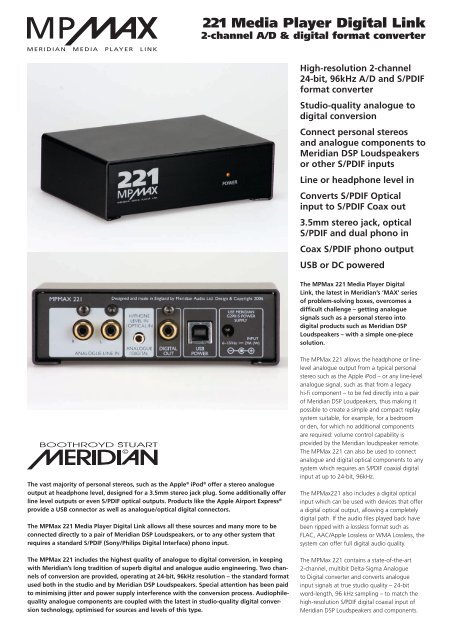
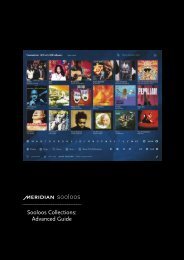

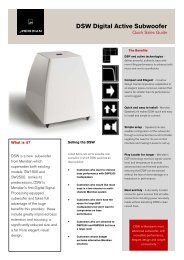
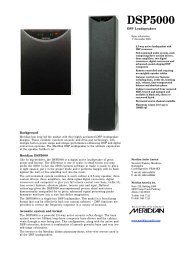
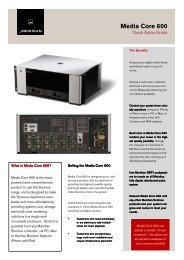
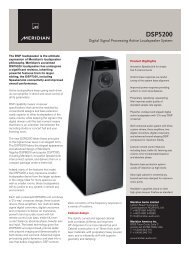
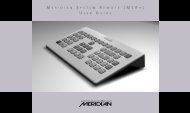
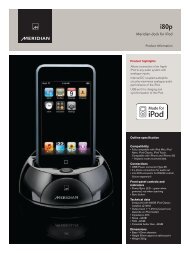
![The Sound of Minute Repeaters Bob Stuart - meridian-audio[.info]](https://img.yumpu.com/27188010/1/184x260/the-sound-of-minute-repeaters-bob-stuart-meridian-audioinfo.jpg?quality=85)
